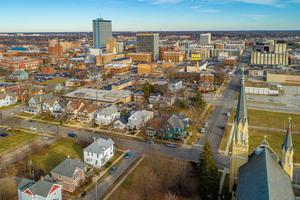A Look at Karol Wojtyla the Writer
BOOK PICK: Wind From Heaven: John Paul II — The Poet Who Became Pope
WIND FROM HEAVEN
John Paul II — The Poet Who Became Pope
By Monika Jablonska
Angelico Press, 2017
202 pages, $17.95
To order: angelicopress.org or amazon.com
They say that the Spanish cardinals who showed up for the second conclave of 1978 had copies of Amor y Responsabilidad in their suitcases. I don’t know if that’s true, but I certainly agree with Krzysztof Dybciak who, in this book’s epilogue, writes:
“Chronologically, Karol Wojtyla was first a writer, then a Catholic priest, and finally the pope. Without his writings in a variety of literary forms and styles, from poetry and drama to sermons and philosophical and theological treatises, he would not have become the head of the Catholic Church.”
Karol Wojtyla’s pre-papal corpus is huge, but it is also neglected. Part of the reason is that it’s hard: One story has it that confessors in Krakow would assign reading The Acting Person as penance for the most obdurate sinners. But the reward of wrestling with Karol Wojtyla is that you encounter no ordinary thinker, content to pen aphorisms that would fit in a self-help book. Chapter 9 provides an overview of Wojtyla’s major books, like Love and Responsibility, Sources of Renewal, and Person and Act.
A very special dimension of Wojtyla’s body of work is his poetry and drama. The future pope was a poet and playwright, although his subjects and genres were — like him — not well understood because he was so ahead of his time.
That dimension is also the most valuable part of Monika Jablonska’s book: Parts III and IV delve into Wojtyla’s poems and plays in individual chapters like “Thinking My Country,” “Our God’s Brother,” “The Jeweler’s Shop” and “Radiation of Fatherhood.” She strikes a good balance, preserving the style of a popular introduction to Wojtyla’s literary output, neither superficial nor going into extreme depth. Consider these thoughts about Wojtyla’s poem The Quarry:
“Wojtyla presents the harshness and murderous pace of a worker’s life, the dignity and drama, and shows the toll hard physical labor takes on a worker’s body. For the poet sees labor for what it really is: an exhausted human frame drenched in sweat; unending human effort underpinning the entire civilization. Exploding rocks become a metaphor for the eternal struggle between the inexorable force of nature and the willpower and labor of man. In Wojtyla’s poem, man matures through labor. Work acquires a redemptive, sacred quality which no one can take away from man. The unique dignity of human labor stems from the fact that it is a part of creation. Its greatness resides entirely inside man. Labor is born in his heart. Through the strain of work, man draws closer to God.”
I’d even recommend reading Jablonska’s introductions before tackling the original work: She’ll help you better understand the writing.
Parts I and II provide background: the Polish background of the Pope and how it shaped who Karol Wojtyla was and his thought. She is especially interested in pointing out the sources of Polish history and literature that shaped the poet-turned-priest. One criticism: Jablonska talks about Romanticism as a movement in Polish literature, but she never really introduces it as a subject on its own, which would have benefited readers less familiar with it.
The book includes a foreword by Cardinal Stanislaw Dziwisz, the Pope’s former secretary, and a chapter paying tribute to the friendship and collaboration of Pope John Paul II and Ronald Reagan.
Karol Wojtyla’s writings, born of his background and experience, are not just books to be read. They are the grist of rich meditations. Jablonska helps open those meditations for the reader.
John M. Grondelski, Ph.D., writes from Falls Church, Virginia.
- Keywords:
- john m. grondelski
- poetry
- st. john paul ii

















